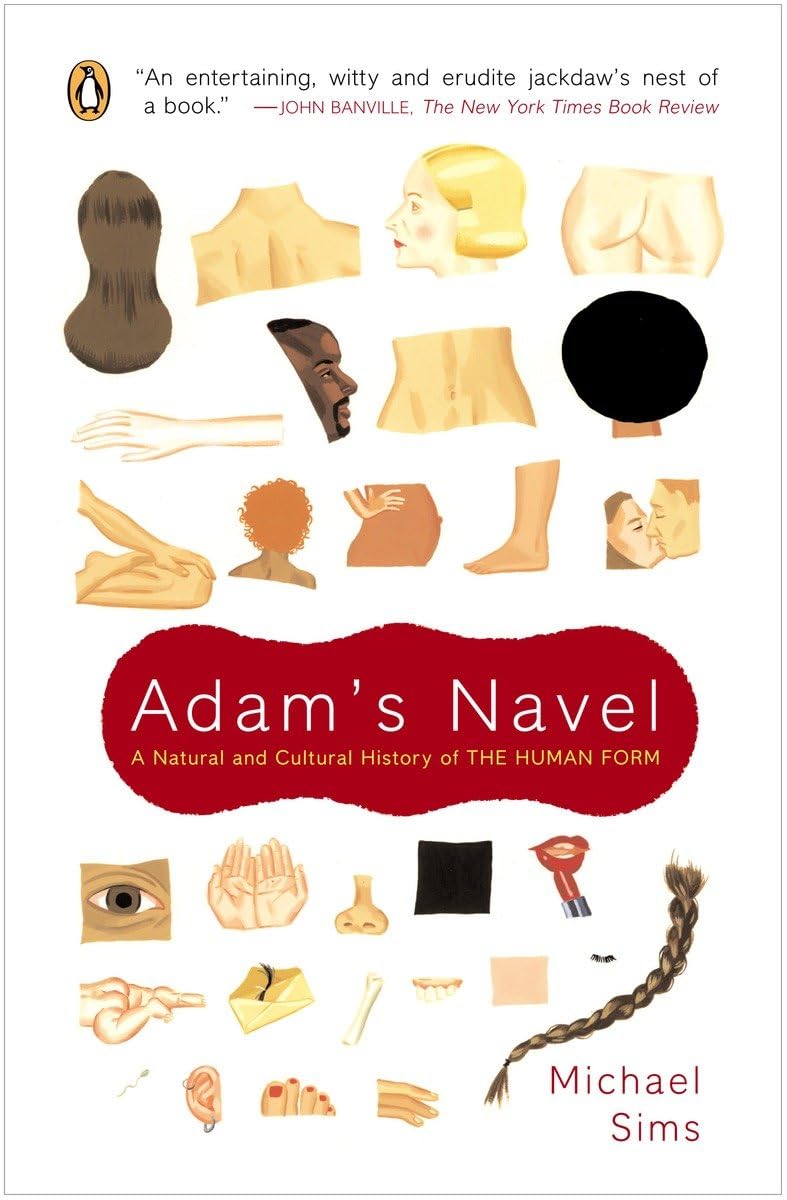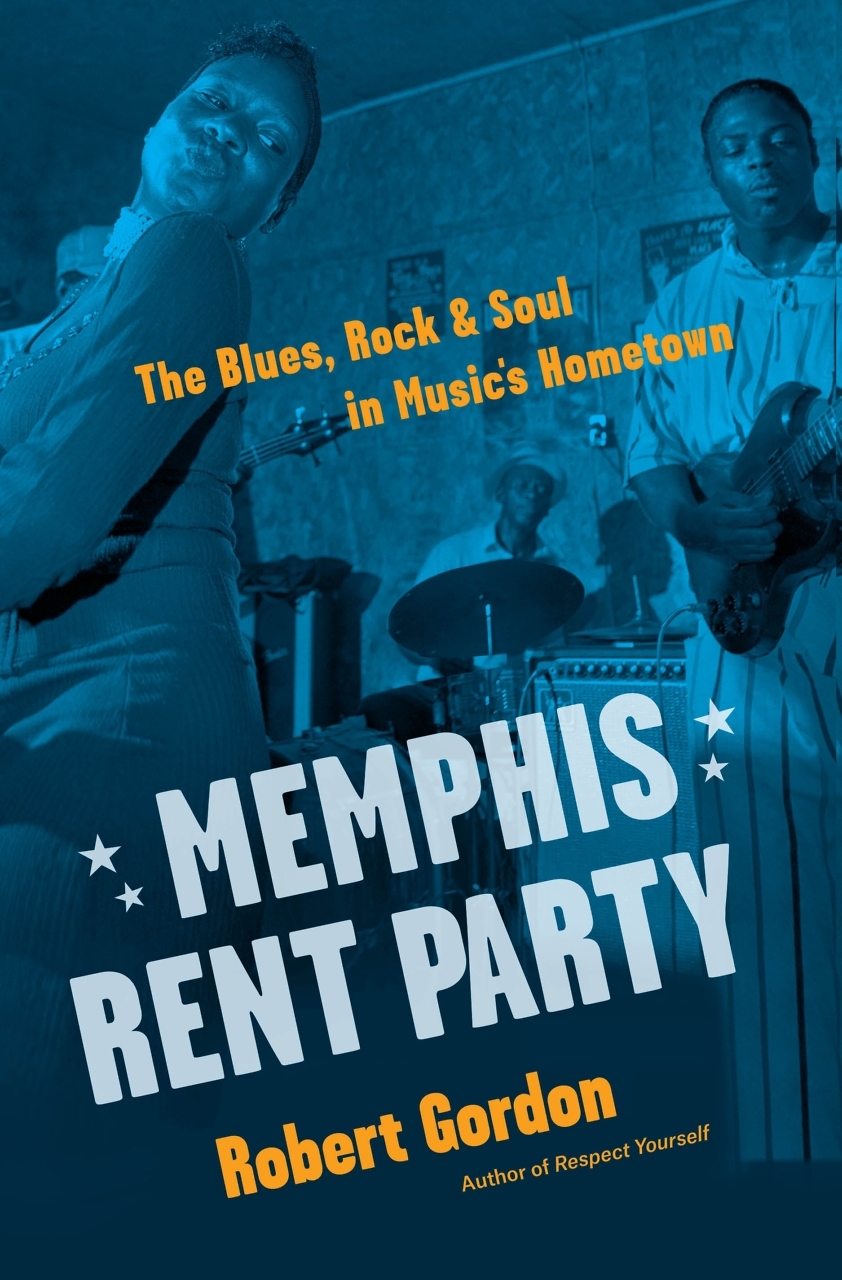Believing in the Power of the Heart
Rockvale Writers’ Colony, a new retreat in College Grove, offers writers the time, space, and support they need
Sometimes long ‘marriages’ don’t work out. I had just left my literary agent of twenty-seven years, a bittersweet parting. My new agent was responsive and kind and thoughtful, but she wanted me to rewrite the novel I’d already been working on for years, and she wanted the new draft in just six weeks, before the London Book Fair.
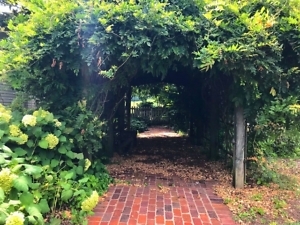
I’d already rewritten the manuscript five times, and I didn’t know whether I could face it again. A novel is a sprawling work: voices, characters, timelines, emotions. As with that tangle of cords and cables you stash in the back of your closet just in case you’ll need them, even though you’re not sure what half of them are for, I feared that if I pulled on one cord, the others would tighten into a death knot. How would I ever rewrite the whole book and hand it in on time? Fortunately, I had a plan: I’d apply to Rockvale Writer’s Colony.
Just a month earlier, on an unusually soft November afternoon, I’d driven with my friend Gloria Ballard, a Nashville journalist, to College Grove for the opening reception of the new Tennessee writing retreat founded by poet and painter Sandy Coomer. The trees were aflame, the hills gilded with afternoon light. In nearby fields, cows mooed mournfully. Though only forty-five minutes from Nashville, College Grove was a world and a century away.
Spotting the Rockvale sign, we turned up a steep driveway toward a charming old house with a rocking-chair porch. As we skirted it, the modest dwelling seemed to unfurl. In 1993, the Ogilvie family had expanded the original 1853 farmhouse into The Peacock Hill Country Inn by adding a long single-story wing. The inn flourished from 1994 to 2004, when the Ogilvies decided they were ready for an easier life. It remained an occasional family retreat, mostly ignored, until Coomer purchased the property, furniture and all, and converted it into a writer’s colony.
But why? Coomer explains that when she first began to write poetry, a number of experienced writers helped her, particularly poet Bill Brown. “He taught me, he believed in me, he gave me the gift of his time and attention,” she said in a recent email. “He changed the way I thought about poetry—my poetry and my writing. I began to believe in myself because he saw something in me worthy of belief. His faith in me made me brave.” For Coomer, creating a writers’ colony would be a way to pay that gift forward, to help other writers believe in themselves.
In the Peacock Hill Country Inn, she found the perfect spot. The grand old living room with its fireplace and high ceilings, its sofas and rugs, seem to whisper, “Come sit a spell.” The halls are lit with bright natural light, and the guest rooms are luxurious and welcoming, most with both spa tubs and showers. (The inn life for writers!) Peaceful views of the Tennessee hills invite meditation and creative epiphany.
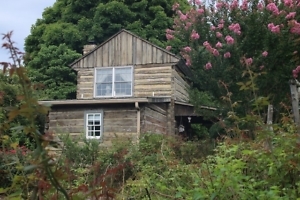
In addition to the main house, the property includes writers’ rooms in a rustic log cabin, a granary, and a newer structure that also houses the Colony office. There are gardens, a swimming pool, a tennis court. Could writers really deserve of such luxury? After visiting the open house, both Gloria and I knew that someday it would be just what we needed to do the sort of concentrated work we could never do from home.
That’s the funny thing about writers: they work best in a hypnogogic state. Hypnogogia is an esoteric word meaning “the bridge to the subconscious.” It takes focus, an almost meditative calm, for a writer to draw from his or her mysterious well of creativity, and the road to that creative state can be painfully rutted as daily life gets in the way. Some writers never arrive. Others hit the bottle. The occasional author becomes a hermit.
A place like Rockvale exists to take writers out of their ordinary lives and lull them into creative success. I knew it was what I needed to make my deadline—if they’d have me. Desperation was buck naked on my application: “Please take me! I have a book to finish on deadline!” I sent off five sample pages and then waited, not patiently. When the letter arrived offering me a three-week residency in January, the relief almost hurt. Still, I could not imagine what a gift those weeks would be.
It was moonless and icy the night my husband drove me down. If you live in the city, the countryside offers an unfamiliar level of darkness that teeters between peaceful and spooky. I was glad I’d first become acquainted with Rockvale in its bright beauty. Happily, the huge kitchen seemed even more welcoming at night. With its warm wood cabinets and well-loved pots hanging from the ceiling, it was clearly the heart of the home, a place where both soup and friendships might be made.
Sandy Coomer was there to greet us. Her sweet, gentle nature, her enthusiasm, and—I later discovered—her prodigious talent as a poet and artist make her the perfect den mother for a group of lucky and disparate writers. The colony’s assistant director, Heather Meek, is also on hand to keep the old house running and the writers happy.
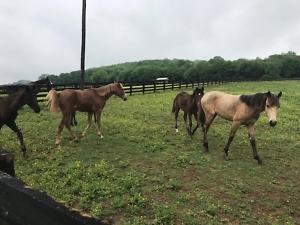
My husband and I toted in Styrofoam coolers of food—at Rockvale, writers are responsible for their own meals—and Coomer ushered me to the Giles Hill Room, my new digs. A large room with windows on two sides, the room boasts a king-size canopy bed, a huge walk-in closet, and a bathroom bigger than most New Yorkers’ apartments. When I kissed my husband goodbye, I felt as giddy and as anxious as a teenager being dropped off for college. Would I be able to make good use of my time? Would I feel at home? Would I find my muse?
The answer is yes and yes and yes. With Coomer’s help, I set up a little nest for writing. Instead of a desk, I prefer a comfortable chair and ottoman, with a laptop on my lap, and Coomer found just the right ottoman in another room. Soon, with views of the fields all around me, I was writing six, eight hours a day, something I could never do at home. I fell into the world of my novel like Alice down a rabbit hole. I lost all sense of time, place, and daily cares.
Whenever I climbed out, there were other writers to talk to and meals to share. I made some interesting new friends. One, a college professor from Pennsylvania, was translating a French novel based on a historical incident about fourteen African women swept up into the eighteenth-century slave trade. We cooked side by side and discussed translation, slavery, our writing, our processes, our lives. Another writer, an evangelical Christian, was working on a book to help parents talk to their children about sex. Our political views could not have been more different, yet we, too, became friends. In the third week, a writer arrived who vividly shared her hikes around the world despite a chronic disabling disease.
During the days, I made time for meditative walks past streams, creeks, and waterfalls, passing field after field of cows and horses. At first the cows galloped away from me when I passed, but within a few days, they began to press their soft brown noses against the fence to greet me or cried out to catch my attention.
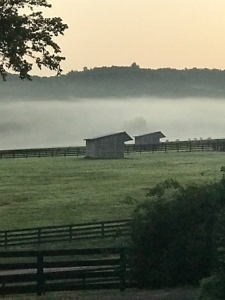
At the end of three weeks, my manuscript had turned from a tangle of cords into a tapestry. A miracle. My new agent was thrilled and sent the book out to a number of editors on the Friday of a long weekend. By Tuesday, we were thrilled by how many had called to say they were interested. One turned out to be the editor of my dreams. And at the London Book Fair, my publisher sold the book to a number of countries for translation. Atomic Love will be published in Fall 2020 by G.P. Putnam’s Sons.
None of this could have happened without my three-week stay at Rockvale. When I think back on my days in the Giles Hill Room, I feel starry, as though recalling a love affair.
“I couldn’t have predicted the impact RWC has had on writers,” Coomer wrote in an email. “I hoped people would feel comfortable and safe, that they would make headway on their writing, but I never dreamed how good it would feel to hear the response writers have regarding their stay.
“Whenever I leave to go home after a retreat is over and I’m so tired, there’s a sense of knowing all this is how it’s supposed to be, that ‘believing in the power of words’ (our tagline) is in fact believing in the power of the heart, in the power of the writer, the person—which is, when you think of it, how it all started in the first place, when Bill Brown believed in me.”

Jennie Fields received an M.F.A. in creative writing from the University of Iowa Writers’ Workshop and is the author of four novels: The Age of Desire, Lily Beach, Crossing Brooklyn Ferry, and The Middle Ages. She lives in Nashville.
